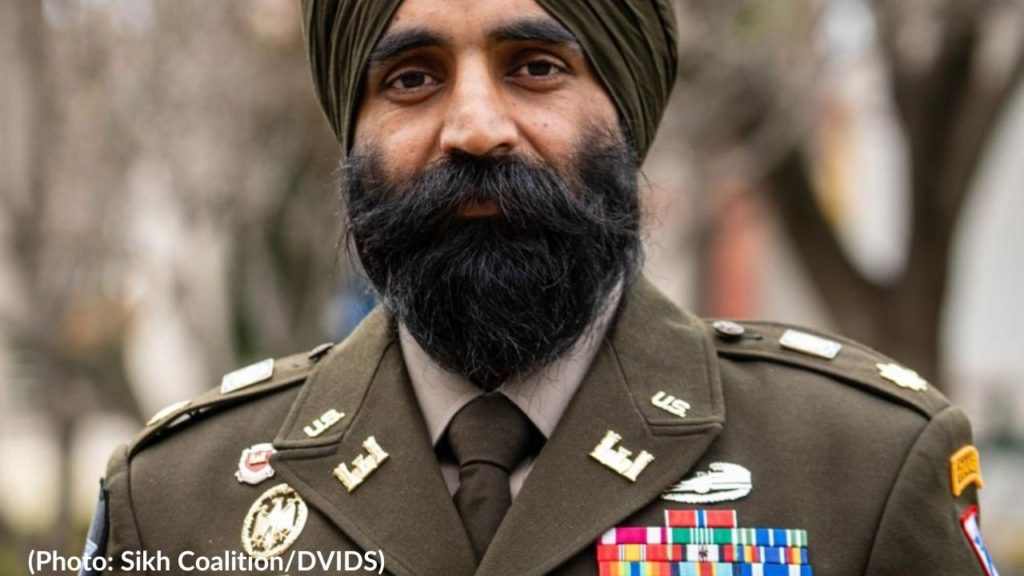Soldier finds balance with Army and Sikh faith

Story by Russell Toof, U.S. Army Garrison Fort Leavenworth | Courtesy of DVIDS
FORT LEAVENWORTH, Kan. — For new cadets at West Point, a trip to the barbershop on reception day is a normal part of the first day routine. For males, their heads and beards are shaved. This aligned with the Army regulation for grooming standards. For Maj. Simratpal Singh, then Cadet Singh, this would put him at a major crossroads of his faith and beliefs and his willingness to serve his country.
Singh was born in Punjab, India, an area that borders India and Pakistan. He came to the U.S. in 1997, when he was about nine, about two years after his father came to the U.S. seeking political asylum due to local security forces targeting Sikhs.
“I have fond memories of growing up,” said Singh. “We lived on a farm, and it was our house and our neighbor’s house. I remember running around in wheat fields, playing late in the evenings, having animals, it was typical farm living.”
Punjab had been experiencing a separatist movement with the Sikh faith, gaining traction since the Green Revolution of the late 1960s. The height of the violence came in 1984 when “Operation Bluestar” occurred, resulting in a decade-long conflict.
“As a Sikh with a beard and turban, you could be picked up by local security forces and killed,” said Singh. “That’s what we were escaping. We were at risk. My dad applied to a bunch of countries and thankfully the U.S. accepted us.”
After initially coming to California, Singh and his family moved to Seattle. He was a junior in high school when he first learned about the United States Military Academy at West Point.
“Sikhs have a very strong military tradition,” he said. “I grew up hearing stories of Sikhs fighting against oppression. Sant Sipahi. A ‘saint warrior.’ I was fascinated with that concept since childhood and I knew from an early age I wanted to do military service. My great-grandfather served in WWI for the British. My parents were supportive of military service, but they had always stressed education as well. West Point would let me get a commission and a college degree.”
Singh said he was already accepted into the academy in 2006 when he was told he would need to shave his beard and take his turban off.
“It was a shock to me finding that out,” he said. “I reached out to some local Sikh community members for assistance and they said they couldn’t help get an exemption passed. I was naive thinking I would go to the academy and explain and it would be fine. At the barbershop is when I knew I had to make a decision on which way I was going to go.”
To give back to the country that had allowed his family to escape the turmoil in India, he complied and shaved his beard.
“I couldn’t look in the mirror for the first two weeks at the academy,” he said. “I felt like the very values that would make me a good soldier, are the ones I had violated by giving up on my faith. The rigors of the academy are what got me through and I tried to focus on being a good cadet. My dad always told me it’s easier to change the system from within. Let me go into the Army and focus on being the best soldier I can be. Maybe down the road, I can figure out how to get back to my roots. How to have my beard and turban and practice my faith.”
Just a few years after leaving West Point, Singh found himself at the Pentagon for an event sponsored by the Sikh Coalition, a Sikh-American advocacy group that defends Sikh civil rights.
“I don’t know how it all worked out this way,” said Singh. “There were three Sikh soldiers before me that were granted a one-time exemption. They were at this event. I was talking to some lawyers at that event and they said they could help me.”
That event became the catalyst that eventually led to him receiving a religious accommodation, one that received national media attention and paved the way for other Sikhs in the military. In January 2017, the Army issued new regulations stating that Sikh soldiers will not be forced to give up their religious turbans, hair, or beards throughout their military career.
“It’s remarkable that this change happened,” said Singh. “I know close to 100 Sikhs in the military that didn’t have to make the miserable choice that I had to make. I worked with two young Sikh men in 2017 who were applying to West Point, they were given the approval. Upon their graduation, I was an instructor there and was able to administer the commissioning oath in 2021 as they finished their time at West Point. To go full circle in the process is stunning and I never would have imagined it.”
Since the Army change in 2017, Singh has worked with the Sikh Coalition and other partners to create policy changes in the Air Force, Navy and most recently the Marine Corps. In late December 2022, Marine Corps Times reported that the U.S. Court of Appeals for the District of Columbia granted a preliminary injunction that will allow two Sikhs to go through Marine Corps boot camp with their Sikh articles of faith. The Marines had been the only military branch that would not offer full religious accommodations to Sikh recruits. There was already a limited stateside-only exception in place for grooming standards for a Sikh Marine after the 13 weeks of recruit training.
Singh said he was proud to have been able to attend the appeals court hearing in November 2022 as an example of the Army getting it right and was glad the court made its decision in favor of the two recruits.
Over his military career, Singh has completed Ranger School, received a Bronze Star medal for clearing IEDs in Afghanistan, and received both a bachelor’s and master’s degree in engineering as well as a Master of Business Administration.
Currently attending the Command and General Staff College at Fort Leavenworth, Singh said he hopes to go back to an engineer unit when the course finishes in June 2023.
“My branch is engineers and it’s been a great choice so far.”


